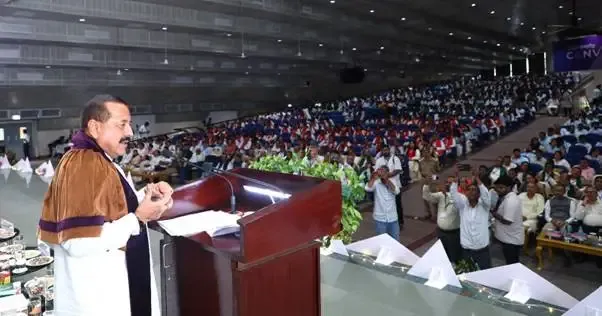Should Students Become Drivers of Innovation-led Enterprises? Jitendra Singh's Perspective

Synopsis
Key Takeaways
- Students should embrace entrepreneurship.
- India's innovation potential is vast.
- Collaboration is key.
- IIT Roorkee's role in the startup ecosystem is vital.
- Himalayan studies can enhance academic offerings.
New Delhi, Sep 5 (NationPress) Union Minister Jitendra Singh urged graduating students to transcend their reliance on government and corporate jobs, advocating for them to become the catalysts of innovation-driven enterprises. During his convocation address at IIT Roorkee, the Minister of State (Independent Charge) for Science and Technology, Earth Sciences, emphasized that India's recent strides in vaccine development, space exploration, and innovation rankings were achieved through a collaboration of government support, private initiative, and youth talent.
“You are living in a remarkable era,” he expressed to the graduates. “Your destiny has provided you with this extraordinary opportunity, and I am confident that you will seize the prospects that India presents today,” Singh remarked.
The Minister commended IIT Roorkee, established in 1847 as Asia's first Engineering College, as a paradigm that integrates research, innovation, and community engagement.
In the latest NIF rating, the institution, formerly known as the University of Roorkee, was recognized as the 6th best in the country, the Minister noted.
Highlighting the institution's academic versatility and strategic location, Singh encouraged it to pursue Himalayan studies covering topics from disaster management to the aromatic economy.
He pointed out that IIT Roorkee’s nearly 240 startups, out of a total of 1.7 lakh across India, underscore its vital role in the nation's startup ecosystem.
“Your nine centres of excellence, groundbreaking work in disaster risk, resilience, and sustainability, along with your active involvement with local communities through initiatives like Vibrant Villages make you a true model for others,” he asserted.
He further stated that the institute's geographical positioning in the Himalayas renders its contributions crucial not only in disaster response but also in what he referred to as a “peacetime calendar” for fostering resilience and growth.









